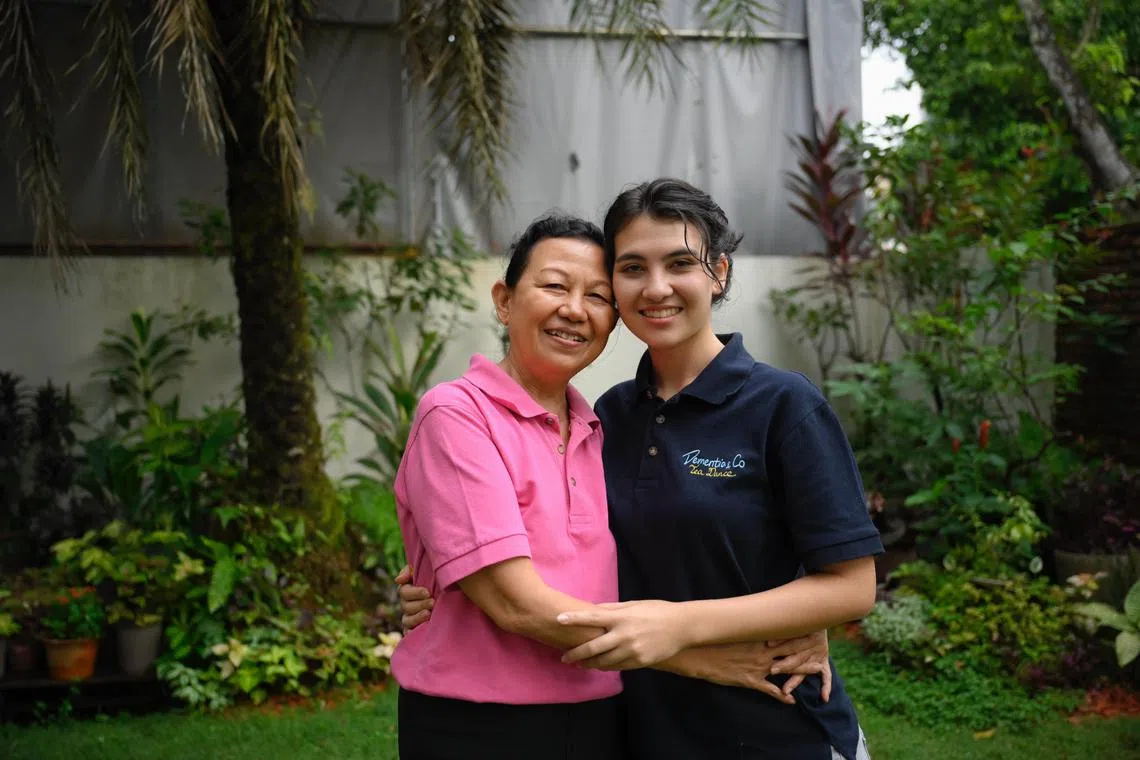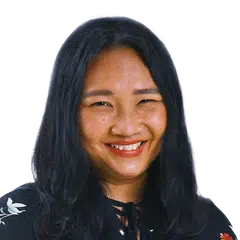Young caregivers: ‘I was afraid. I thought, what am I going to do?’
Sign up now: Get ST's newsletters delivered to your inbox

Speech and drama teacher Jamie Lynn Buitelaar and her mother Alison Lim, who has dementia, consider themselves “research and care partners”.
ST PHOTO: MARK CHEONG
SINGAPORE – In 2016, when Ms Alison Lim learnt from her doctor that she had young-onset dementia at the age of 58, she felt a sense of relief and understanding.
The retired manager and consultant from the hotel industry recalls: “I was so relieved because it had been so confusing.”
Starting in 2012, she and her family noticed she had been mixing up words. At a Mexican restaurant that year, she asked for Guatemala instead of guacamole. She would later say things like “put the table on the plate” or “put the car in the key”.
“It was funny, but it was also very scary. I knew something was not right with my brain,” says Ms Lim, adding that it had been a hard-won diagnosis, as several neurologists had insisted she was fit and fine after a battery of tests.
Even after she could put a name to her condition, some of her doctors begged to differ, saying she had memory issues instead.
Young-onset dementia refers to dementia that develops in persons below the age of 65. Ms Lim, now 67, has a form of the condition called primary progressive aphasia (PPA), which affects word retrieval. She is married to a Dutch businessman and the couple have a daughter, Ms Jamie Lynn Buitelaar, a 28-year-old speech and drama teacher.
Ms Buitelaar was only 19 years old and accompanying her mother when Ms Lim received her diagnosis. She was alarmed when the doctor told Ms Lim to make her will and expect to live just five to eight years, but attempted to maintain a poker face, she says.
Ms Lim recalls: “Jamie was trying to be calm, but she was frozen. The first thing I said to her was, ‘Don’t be ashamed of me, don’t hide me at home.’ I wondered, how can she go through this life with me now?”
The mother and only child had always been close, but Ms Buitelaar says she was in denial and hid from confronting the reality of her mother’s condition for about a year.
She went about her undergraduate routine, living in a residence hall at Yale-NUS College, returning home only on weekends and asking nominally how her mother was doing.
Meanwhile, Ms Lim was participating in research programmes in local hospitals and overseas universities, to find out more about PPA with her characteristic curiosity and vigour.
Her symptoms included headaches, fatigue and episodes of feeling like her brain was cracking. Her words sounded blurred when she spoke, and she would lie down on a couch for hours to recuperate.
Ms Buitelaar recalls: “I was afraid. I thought, what am I going to do? There is no cure, no drug. If I can’t do anything, then would I just come home to be sad, and we would both just cry? I was trying to figure out what to do, but it started to become untenable, how we weren’t really talking.”
One day, she decided to play a word game with her mother, which she had played with her friends. She and Ms Lim then started on brain training games on the Lumosity app, as well as other word games where, for instance, they would name animals that began with each letter of the alphabet.
At the end of their tough first year in 2016, mother and daughter co-founded the ground-up initiative Dementia & Co. They organise tea dances and outings for persons with dementia (PWDs) and their caregivers, and encourage more than 200 families to engage in forums to destigmatise dementia and enable PWDs to share their experiences.
Ms Lim, who volunteered with seniors and PWDs for years even before her diagnosis, is an outspoken advocate of “partnering (her) dementia and enjoying the journey”.
Eight years on, mother and daughter have developed “specific protocols” to manage Ms Lim’s condition.
For example, they realised that it helped Ms Lim to associate emotions with words. The word “stove”, for instance, is tethered to “how Jamie burnt her hand on the stove when she was three years old, and I felt so much pain”, says Ms Lim.
Ms Buitelaar remains very protective of her mum, and alert to any new symptoms or signs of tiredness. “She’s very well-spoken, and it’s easy for people to not notice what she does to maintain the function she has,” says Ms Buitelaar.
Behind the advocacy and poise, Ms Lim recalls numerous social gatherings and functions where she fled to the toilet to break down as words eluded and frustrated her.
There were incidents where she could not call her daughter by her name – Ms Lim said her sister’s name instead – which still bring tears to Ms Lim’s eyes.
She and her daughter now consider themselves “research and care partners”.
Ms Buitelaar says: “It allows us to care for each other. It’s part of the care that I don’t pity her. Being patronised is one of the most harmful things because it dehumanises her.
“Dementia has made our relationship stronger.”
Ms Lim adds: “I want to be independent, and I want her to be independent as well. I’m free and having fun in life.”
Correction note: In an earlier version of the story, we said that Yale-NUS College is “now-defunct”. This has been corrected.



